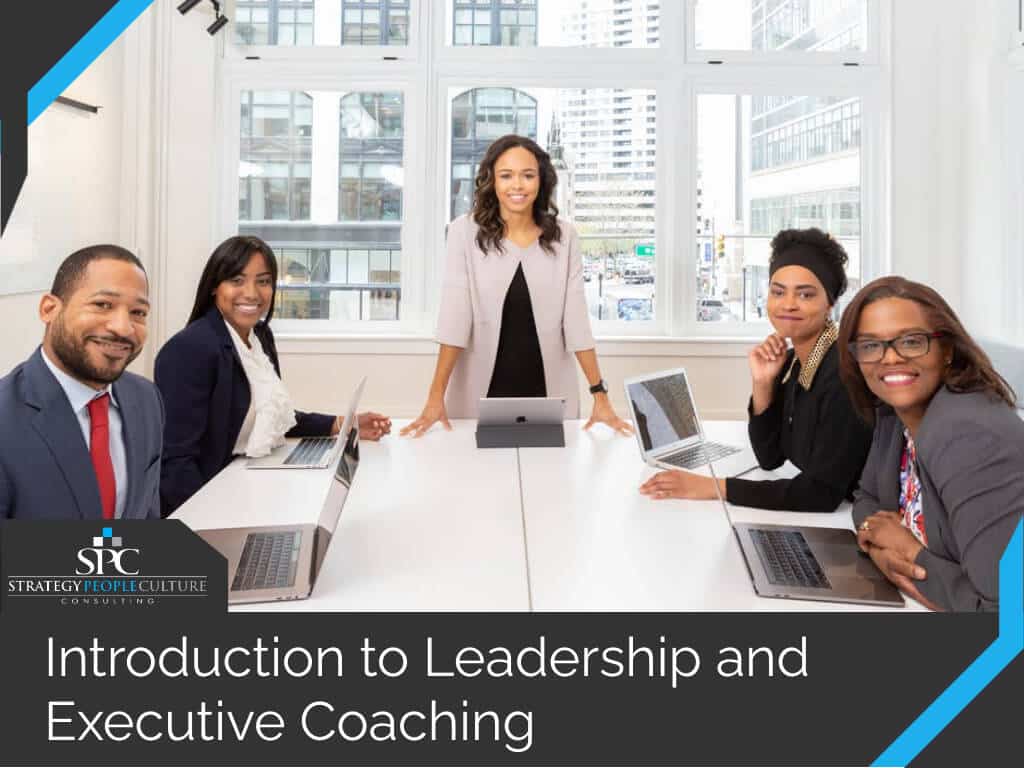Introduction to Leadership and Executive Coaching

When you think of an executive coach, what image comes to mind first?
A cheerleader who comes in to boost your or your company morale?
An advisor to give you insight on how you could make better operational decisions?
A private trainer for those who want to climb corporate ladders?
A “life” coach for people in positions of power?
Today on the Strategy People Culture blog, we want to talk about what leadership and executive coaching really does – and why it’s more valuable than you might think.
What Is Executive Coaching?
In the simplest of terms, executive coach partners with their clients to unlock a leaders’ full potential. These coaches come onto the scene to teach current and up-and-coming leaders how to maximize their performance – both for the executives’ personal/professional growth and for the good of those they oversee, resulting in stronger long-term organizational performance.
An executive coach understands what makes a great executive team member – and what doesn’t. More importantly, great leadership coaches understand there is no singular style or approach to being a strong leader. Therefore, an executive coach will not judge you, your style, or your choices; instead, your leadership coach will expand your perspective and think to make better decisions and create sustainable leadership steps forward. Executive coaching will do this, in part, by setting you up to learn both from your successes and missteps.
Think of these coaches as the oil that helps a machine chug along more smoothly. A strong executive team directly impacts company culture, productivity, employee retention, and communication. Executive coaches help leaders focus on these issues and help maximize their effectiveness in these areas.
It doesn’t matter if you’re a new executive or a grizzled veteran leader. There’s always room for improvement, and an executive coach will help you discover solutions, explore your true capabilities, and overcome challenges.
What Is Leadership Coaching?
“Executive coach” and “leadership coaching” are not always synonymous.
Some consider leadership coaching as part of the larger umbrella of “executive” training. Executive coaching focuses more on decision making and team guidance, while leadership coaching focuses more on:
– Developing stronger emotional intelligence (EQ)
– Understanding how to “inspire” followers and create more engaged team members
– Building superb, impactful communication skills
– Fostering elevated self-awareness
It takes many circumstances to become an executive at a company. Still, it takes a special talent to be fully mine the absolute best from those following and being a truly respected leader. A leadership coach will help you learn how you show up authentically as a leader, address difficult situations, create clear expectations, more effectively delegate and from an insecure, self-centered commander.
So, you’re probably wondering, when do you need executive coaching, and when do you need leadership coaching?
At Strategy People Culture, we believe that these two coaching styles are different sides of the same coin. However, they provide the most effective, powerful coaching a growing leader can find when coupled together. We believe every open-minded leader could benefit from an executive and leadership coaching relationship.
What Does a Coach Focus On?
It doesn’t matter if you’re looking for an executive or leadership coach: both should share similar values and focus on the same ultimate goals, including:
- Partnering with you to mold your leadership style to the person you are and the best leader you can be. This will extend to specifics around your particular industry, organization, and team; however, it will become developed skills that should help you in any situation.
- Challenging your skills, provoking you to think more broadly, and ultimately creating sustainable lessons that increase your leadership qualities.
- Supporting you through professional career growth and helping you through tough transitions.
- Exploring solutions to specific issues with people or your business.
Partnering with an executive-leadership coach gives you the support structure you need to flourish in positions of power and influence. You’ll have the chance to focus on core issues and strengths while also developing strategies specifically for your organization and team.
It’s not all fun and games. Working with a coach means challenging your leadership skills and understanding what it truly takes to inspire and guide others. You’ll be pushed, but in the end, your return on investment will prove gratifying, and hopefully feel like it has become one of the best decisions you made.
Many executive and/or leadership coaching recipients report stronger self-correction techniques, better command and respect from their team, personal and professional growth, and greater confidence in their long-term strategies and decisions. While our track record is even greater, published research suggests that roughly 70 percent of coached individuals benefited from improved work performance, relationships, and more effective communication skills. Others reportedly:
- Became more self-reliant.
- Felt more satisfied with their job and overall life.
- Began to contribute more effectively to their teams.
- Worked more easily, productively, and closely with others.
What an Executive Coach Does Not Focus On?
Now, let’s clear some misunderstandings up and talk about what executive coaches don’t do.
Most predominantly, these coaches do not conduct therapy sessions. They are not psychologists or psychiatrists, which means they do not:
- Provide counseling
- Write prescriptions.
- Diagnose personalities or disorders
Although you may develop an extremely close relationship with an executive coach, they are not and will never be replacements for a therapist. As skilled, trained, and experienced as some of our coaches are, clinical therapy is a specific and different skill set. In fact, a good coach will recommend the need for therapy in some situations.
Additionally, executive coaches do not come in with a one-size-fits-all game plan. Every client needs something different to unlock their potential as a great leader – and that means that all Strategy People Culture coaches will focus on individualized plans, not cookie-cutter words of wisdom.
Sometimes, a coach may focus on being more of an accountability partner and figuratively hit you straight between the eyes when you need such a challenge. In other instances, they may play the devil’s advocate and push you to think outside the box. It all depends on your personality type, goals, and needs.
How to Pick a Great Executive or Leadership Coach?
Once you’ve decided to hire an executive coach, the hunt begins. Of course, there’s a lot to evaluate as you look for the perfect partner, but we’ve narrowed it down to three of the most important traits to look for in a great coach.
Proven Experience
You wouldn’t want to learn to practice surgery from a surgeon who hasn’t set foot in a hospital. Instead, you want to partner with a coach who has, well, coached before. Certainly, some experienced coaches are not very good. Conversely, some inexperienced coaches are tremendous; that said, there is some validity here to ensure you are working with someone who has been working professionally as a coach for at least a few years. Please make no mistake about it; effective coaching is both a skill and art developed over time.
Look for leadership coaches with extensive experience working with executives. – Don’t get caught up in finding someone with direct industry experience; the more experience we have gotten working with more executives across many industries, the more we are convinced successful coaching has little to do with specific industry experience. In fact, working with a specialized coach in a particular industry may limit the challenge they will give you, as they may have the same preconceived thought process.
Consider that “coaching” is a huge field, and no coach is the same as another. Think about what you really want from the experience.
- Do you want a consultant who will tell you what to do or a coach who challenges your thought process to come to your own solution realizations?
- Someone to hold you accountable or hold your hand??
- Are you looking for someone to sympathize with your pain points or push you to get past them?
The more you know about what you want from your leadership coach, the easier it will be to find one that fits the bill.
Trust
This may sound obvious, but you need a coach you feel comfortable with – not someone who intimidates you or even who you want to have a drink with. Instead, you’ll need to find an individual who pushes you to be better while also expressing compassion.
Before committing to any executive coach, talk to them in person or at least over the phone or on a virtual video call. Get a feel for their personality and if you two will mesh well. Don’t be afraid to ask tough questions and really learn about your potential coach’s background.
For executive and leadership coaching to be fully effective, you should partner with someone you are willing to be fully transparent and vulnerable with. You’ll be working closely together for some time – trust will be paramount.
A Great Track Record
Personal testimonies are everything when it comes to picking an executive coach. Don’t hesitate to ask for references and previous client information. Although coaches might offer a personal relationship, they are also providing a service – and you need to know that service is worth paying for. Your executive and leadership coach is there to be your thought and action partner first and foremost, not your friend.
In Conclusion
Whether you’re ready to book your first coaching session or you still have more questions about executive coaches, reach out to Strategy People Culture.
We offer exclusive one-on-one coaching, leadership development opportunities, and executive assessments. Our goal is to improve the way leaders build and maintain relationships, and as a result, optimize themselves for sustained growth.
Now, more than ever, we need great leaders in the world. Learn how we can help unlock your full potential by calling (833) ROCK – SPC or (973) 551 – 0419. You can also schedule a completely free consultation online.




